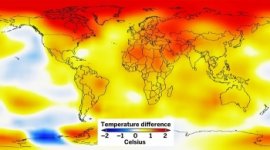Global warming Issues articles
 DISRUPTION
DISRUPTION
This NASA map represents global temperature anomalies averaged from 2008 through 2012.
Credit: NASA Goddard Scientific Visualization Studio
Global warming is occurring at record levels and is due to increasing atmospheric greenhouse gases generated by human activities, according to several new government scientific reports issued in recent weeks. The rapidity of greenhouse gas impacts will make projections and mitigation efforts increasingly difficult and will result in a drastic transformation of Earth’s environment, the reports say.
In a related development, researchers are reporting that airborne black carbon particles—which are a component of soot—hold twice the warming potential as previously thought.
Rising seas, heat waves, erratic and intense rainfall, storm surges, and droughts are among the effects accelerating climate changes now under way. That is one conclusion of a draft report by the National Climate Assessment & Development Advisory Committee, a 60-member federal advisory body established to advise the President and Congress on climate-change issues.
The draft assessment presents a grim picture of the ongoing impact from climate change. Looking to the future, the assessment warns of accelerating effects and the potential to reach a “tipping point” where cumulative climate extremes will exceed mitigation efforts.
The draft report, which is expected to be finalized in 2014, recommends active adaptation to a changing climate and a reduction in greenhouse gas emissions to avoid the worst cumulative climate-change impacts. It warns that scientists may no longer be able to use past climate conditions to predict future ones.
Meanwhile, analyses by the National Aeronautics & Space Administration and the National Oceanic & Atmospheric Administration show that 2012 was one of the 10 hottest years on record, on the basis of global average temperature.
Earth’s global average temperature in 2012 was about 58.3 °F, NASA says, further noting that global average temperature has risen about 1.4 °F since recordkeeping began in 1880.
Scientists from the federal agencies say the ranking of one year’s global average temperature over another is less important than the fact that 2012’s temperature is part of a warming trend that began in the late 1970s.
“What matters is this decade is warmer than the last decade, and that decade was warmer than the decade before, ” explains Gavin Schmidt, climatologist at NASA’s Goddard Institute for Space Studies. “The planet is warming. The reason it’s warming is because we are pumping increasing amounts of carbon dioxide into the atmosphere.”

